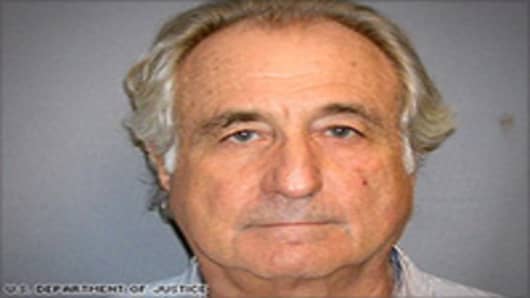The watchdog of the Securities and Exchange Commission has found the agency consistently mishandled its five investigations of Bernard Madoff's business, despite ample complaints over 16 years about the multibillion-dollar fraud.
But SEC inspector general David Kotz's report found no evidence of any improper ties between agency officials and Madoff.
Despite speculation that senior SEC officials may have tried to influence the probes, a summary of Kotz's 450-page report released Wednesday also found no evidence of that.
The SEC enforcement staff, conducting investigations of Madoff's business, "almost immediately caught (him) in lies and misrepresentations, but failed to follow up on inconsistencies" and rejected whistleblowers' offers to provide additional evidence, the report says.
Revelations in December of the agency's failure to uncover Madoff's massive Ponzi scheme over more than a decade touched off one of the most painful scandals in the agency's 75-year history.
Kotz's exhaustive inquiry was intended as an investigation into the SEC's conduct in the Madoff affair and doesn't make recommendations for actions the agency should take. SEC Chairman Mary Schapiro, appointed by President Barack Obama, has brought changes since taking the helm in January. Enforcement efforts have been strengthened and the agency has started a number of initiatives meant to protect investors in the wake of the financial crisis, officials say.
Three of the five high-ranking SEC officials who were lambasted over the Madoff affair at a congressional hearing in February -- including the enforcement director and the head of the inspections office -- have left the agency.
Kotz's report "makes clear that the agency missed numerous opportunities to discover the fraud," Schapiro said in a statement. "It is a failure that we continue to regret, and one that has led us to reform in many ways how we regulate markets and protect investors."
Sen. Christopher Dodd, D-Conn., chairman of the Senate Banking Committee, said that panel has scheduled a hearing for Sept. 10 on Kotz's report, at which the inspector general is expected to testify. The testimony will "guide us as we continue our work on a bill to modernize financial regulations," Dodd said in a statement.
Between June 1992 and last December, when Madoff confessed, the SEC received six "substantive complaints that raised significant red flags" regarding Madoff's operations. But "a thorough and competent investigation or examination was never performed," the report says.
Many of the SEC staff who conducted the three inspections and two investigations were "inexperienced," according to the report.
It cites examinations of Madoff's business done in 2004 and 2005 by the agency's inspections office. In both exams, the staff "made the surprising discovery" that Madoff's mysterious investment business was making far more money than his well-known wholesale brokerage operation. "However, no one identified this revelation as a cause for concern," the report says.
Even more surprising, the two exams were being conducted at the same time in different SEC offices without either location being aware of the other's action. It was Madoff himself who told one of the inspection teams that he'd already given the information they sought to the other team, according to the report.
Madoff pleaded guilty in March. He is serving 150 years in federal prison in North Carolina for a pyramid scheme that destroyed thousands of people's life savings, wrecked charities and gave already-rattled confidence in the financial system another jolt.
The legions of investors who lost money included ordinary people, Hollywood celebrities and scores of famous names in business and sports -- as well as big hedge funds, international banks and charitable foundations worldwide.
Madoff himself, who was once chairman of the Nasdaq Stock Market and had sat on SEC advisory committees, had boasted of his ties to the agency.
The inspector general's investigation found no evidence, though, that any SEC staff who worked on the exams or investigations of Madoff's business had financial or other improper connections with him that influenced the probes.
Kotz's inquiry did not find that the relationship between a former SEC attorney and assistant inspections director, Eric Swanson, and Madoff's niece, Shana, who married in 2007, influenced the conduct of the agency exams. Swanson was part of a team that examined Madoff's securities brokerage operation in 1999 and 2004. Neither review resulted in any action against Madoff.
The SEC's inspections office has said it has strict rules prohibiting employees from participating in cases involving firms where they have a personal interest.
In addition, the IG's inquiry did not find that SEC senior officials "directly attempted to influence" exams or investigations of Madoff or his firm, "nor was there evidence any senior SEC official interfered with the staff's ability to perform its work."
The disclosure in December of the agency's failure in the Madoff affair, coming after the financial crisis struck last fall, buttressed the mounting criticism from lawmakers and investor advocates that Wall Street and regulators in Washington had grown too close.
Christopher Cox, then the SEC chairman, responded by delivering a stunning rebuke to his own career staff, blaming them for the decade-long failure to investigate Madoff.
Cox's critics said targeting the staff was his attempt to salvage his own reputation, and Senate Majority Leader Harry Reid, D-Nev., suggested that Cox bore at least some of the responsibility for what went wrong.
"The SEC's utter failure to follow up aggressively on detailed and specific information about Madoff's fraud is further evidence of a culture of deference toward the Wall Street elite at the SEC," Republican Sen. Charles Grassley of Iowa, a senior member of the Senate Finance and Judiciary committees and a longtime agency critic, said in a statement Wednesday. "Until that culture is transformed, the SEC will not be the tough cop-on-the-beat that the public needs."


